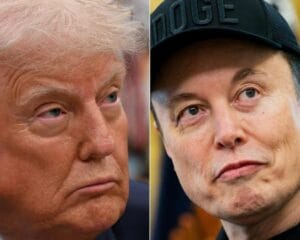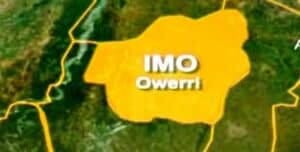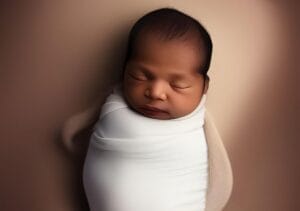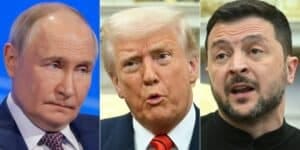President Tinubu Addresses National Assembly on Democracy Day
On Nigeria’s Democracy Day, President Bola Tinubu chose to speak directly to lawmakers at the National Assembly instead of giving a nationwide TV broadcast. This change surprised many, but it was later confirmed by the Office of the Secretary to the Government of the Federation (SGF). The SGF explained that Tinubu would deliver his Democracy Day message live from a joint session of the Senate and House of Representatives.
This special joint session took place inside the House chamber in Abuja. The event began with Senate President Godswill Akpabio and Speaker Tajudeen Abbas welcoming the president and other top officials. Tinubu’s entourage included Vice President Kashim Shettima, the Chief Justice of Nigeria, and several key members of his cabinet.
The opening session featured both Islamic and Christian prayers for the president and the country. Senate President Akpabio gave a welcome address, highlighting the sacrifices made by Nigerians during the struggle for democracy, especially during the events of June 12, 1993. He praised President Tinubu for his role in that struggle and for the economic reforms he has introduced since taking office.
Akpabio noted that under Tinubu, fuel subsidies were removed and tax reform bills have been introduced. He said these policies showed Tinubu’s commitment to a better Nigeria. The Senate president also shared legislative updates, revealing that 844 bills had been introduced in the Senate, with 19 already passed and many more under consideration.
He called for the creation of a museum dedicated to Nigeria’s democratic journey and urged all Nigerians, including the media, to protect democracy as something that must never be taken for granted.
President Tinubu then took the stage for his Democracy Day address. He began by acknowledging Nigeria’s journey since 1999, saying that democracy had come a long way since the days of military rule. He gave special thanks to former President Muhammadu Buhari for recognizing June 12 as Democracy Day and officially acknowledging MKO Abiola as the winner of the annulled 1993 presidential election.
Tinubu paid tribute not only to Abiola but also to other heroes of the June 12 struggle. He mentioned names like Kudirat Abiola, Anthony Enahoro, Alfred Rewane, Ayo Adebanjo, and others who risked their lives for democracy.
In his speech, President Tinubu promised to keep defending democratic values and asked Nigerians to support his administration. He made it clear that he does not support a one-party system, adding that he has never interfered with party registration or electoral processes. He assured the country that Nigeria will remain a multi-party democracy.
Tinubu mocked the internal conflicts within opposition parties but emphasized that anyone was welcome to join the ruling APC. He also highlighted his administration’s achievements, including improvements in the exchange rate, a gradual drop in inflation, and better food prices.
He said the government no longer borrows money to pay salaries and has launched a student loan initiative to help more Nigerians get a quality education. He also revealed plans to empower 400,000 Nigerian youths through consumer credit programs and digital tools to help them compete globally.
Tinubu urged security agencies to respect freedom of speech, stating that even harsh criticism can be helpful in governance. “You can call me names,” he said, “but I will still defend your right to do so under democracy.”
On security, the president said the country’s highways are now safer and that there is better cooperation among security agencies. He praised the military and other officers for their work in keeping the country safe.
President Tinubu also announced national honours for several living and deceased Nigerians who have contributed to democracy and nation-building. Among those honored were Prof. Wole Soyinka, Bishop Matthew Kukah, Femi Falana, and posthumously, Ken Saro-Wiwa and other members of the Ogoni Nine.
One of the highlights was when Tinubu personally decorated the Senate President and the Speaker of the House with national honours during the session. This was a symbolic gesture recognizing their roles in supporting democracy.
After the president’s speech, Speaker Tajudeen Abbas gave a vote of thanks. He recalled Tinubu’s efforts in the pro-democracy NADECO movement and said the House had received over 2,000 bills under his leadership. He also mentioned ongoing efforts to curb the illegal circulation of arms and called for more support for Tinubu’s Renewed Hope Agenda.
The House Speaker noted that lawmakers donated half of their salaries to support the president’s initiatives and stressed the importance of economic diversification through solid minerals.
The event ended with a photo session involving Tinubu, the presiding officers of the National Assembly, and Vice President Shettima. As the president exited the chamber, lawmakers stood and sang solidarity songs. Things briefly became rowdy, but the Senate President and House Speaker brought the session back to order.
Before closing, Akpabio thanked the lawmakers for their attendance, noting he was initially worried there wouldn’t be enough members for a quorum. He announced that the Senate and House would resume sitting on June 24.
The session officially ended after a motion to adjourn was passed, marking the close of a historic Democracy Day event.





